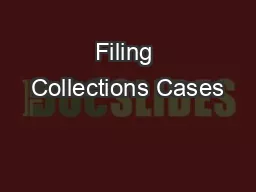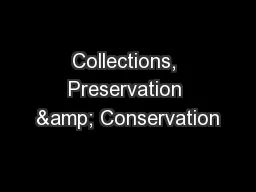PPT-Collections Intro What
Author : debby-jeon | Published Date : 2019-12-05
Collections Intro What is the STL Templates collections amp iterators Adapted from Dr Mary Eberlein Data Structures Collection or data structure an object that stores
Presentation Embed Code
Download Presentation
Download Presentation The PPT/PDF document "Collections Intro What" is the property of its rightful owner. Permission is granted to download and print the materials on this website for personal, non-commercial use only, and to display it on your personal computer provided you do not modify the materials and that you retain all copyright notices contained in the materials. By downloading content from our website, you accept the terms of this agreement.
Collections Intro What: Transcript
Download Rules Of Document
"Collections Intro What"The content belongs to its owner. You may download and print it for personal use, without modification, and keep all copyright notices. By downloading, you agree to these terms.
Related Documents














